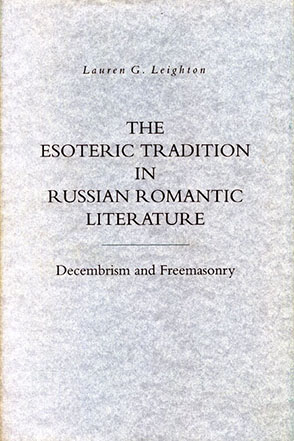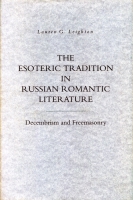
The Esoteric Tradition in Russian Romantic Literature
Decembrism and Freemasonry
Lauren G. Leighton
The Esoteric Tradition in Russian Romantic Literature
Decembrism and Freemasonry
Lauren G. Leighton
“This book is a significant contribution to the field. Other scholars have decoded Masonic and other esoteric elements in Pushkin's writings, but to the best of my knowledge, Leighton is the only one who has revealed the esoteric dialogue between Pushkin and his contemporaries and traced the path by which particular esoteric elements entered into Russian romantic literature. The chapters contain a wealth of material on the writings of certain Decembrists and their context.”
- Description
- Reviews
- Bio
- Subjects
This study, which conjoins historiographical methods developed by modern scholars of esoterica and formalist methods of textual analysis, reveals the role of that tradition in Russian romantic literature. It deals extensively with Decembrism, the political conspiracy so known after its culmination in a failed attempt to overthrow the tsarist autocracy in December 1825. The Decembrist writers and other romantics influenced by Freemasonry, including Kondraty Ryleyev, Alexander Bestuzhev-Marlinsky, and Alexander Pushkin, were adept in the application of thaumaturgical skills to literature. Thaumaturgy denotes the application of arcane skills, some derived from the Cabala, to both the interpretation and creation of encoded literary texts.
The Esoteric Tradition in Russian Romantic Literature also deals with the relationships between Russia's national poet and those writers who made the first major attempt at a Russian revolution. Viewing these relationships through the prism of occult imagery used in various literary works, Leighton tells an engaging story of political intrigue and communication by secret codes.
“This book is a significant contribution to the field. Other scholars have decoded Masonic and other esoteric elements in Pushkin's writings, but to the best of my knowledge, Leighton is the only one who has revealed the esoteric dialogue between Pushkin and his contemporaries and traced the path by which particular esoteric elements entered into Russian romantic literature. The chapters contain a wealth of material on the writings of certain Decembrists and their context.”
Lauren G. Leighton is Professor of Russian at the University of Illinois at Chicago and author of several books, most recently Literary Translation in Russia and America (1991).
Mailing List
Subscribe to our mailing list and be notified about new titles, journals and catalogs.



